BTEC Level 5 HND Unit 16 Operations and Project Management Report
VerifiedAdded on 2020/11/03
|36
|9802
|757
Report
AI Summary
This report, prepared for a BTEC Level 5 HND Diploma in Business, Unit 16: Operations and Project Management, provides a comprehensive analysis of operations management principles. The report begins with an introduction to the chosen company, Starbucks, and outlines the scope of the work. It then delves into a review and critique of key operations management concepts, including definitions of operations, operations management, and operational functions, along with their relationships to other business functions. The report examines the implementation of operations management processes, discussing general operational processes and key approaches. It critically evaluates the advantages and disadvantages of Six Sigma and Lean principles, differentiating their methodologies. A continuous improvement plan is prepared for Starbucks, explaining the application of operations and operations management concepts, identifying current continuous improvement processes, and discussing the roles of Lean principles. The impact of process technology on operational functions and information flows is also considered. Furthermore, the report differentiates various operation approaches, such as TQM and Kaizen, and provides recommendations for improving operational efficiency and effectiveness, supported by comparisons and relevant theories. The report concludes with a summary of key findings and analysis, and includes a critical self-criticism.
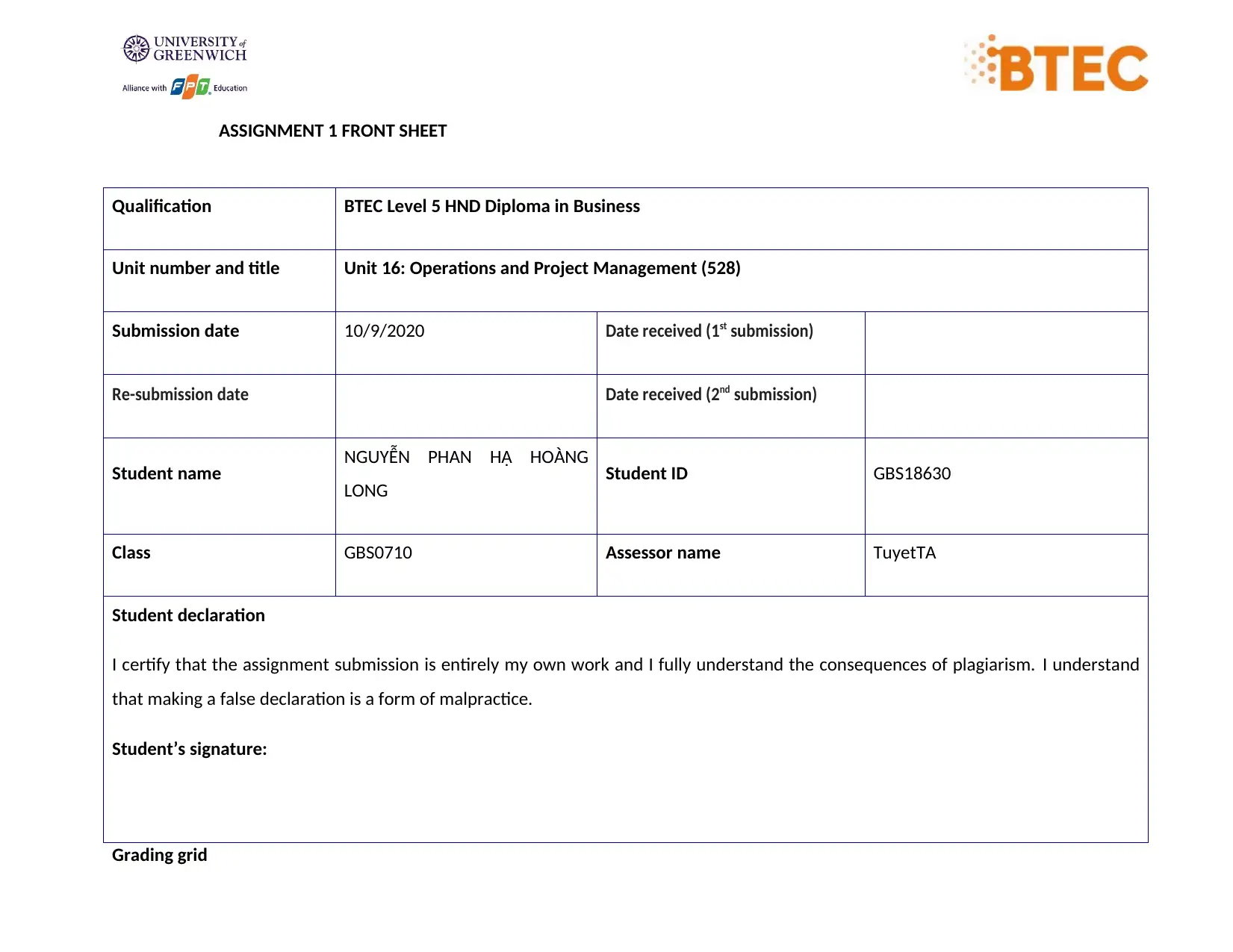
ASSIGNMENT 1 FRONT SHEET
Qualification BTEC Level 5 HND Diploma in Business
Unit number and title Unit 16: Operations and Project Management (528)
Submission date 10/9/2020 Date received (1 st submission)
Re-submission date Date received (2 nd submission)
Student name NGUYỄN PHAN HẠ HOÀNG
LONG Student ID GBS18630
Class GBS0710 Assessor name TuyetTA
Student declaration
I certify that the assignment submission is entirely my own work and I fully understand the consequences of plagiarism. I understand
that making a false declaration is a form of malpractice.
Student’s signature:
Grading grid
Qualification BTEC Level 5 HND Diploma in Business
Unit number and title Unit 16: Operations and Project Management (528)
Submission date 10/9/2020 Date received (1 st submission)
Re-submission date Date received (2 nd submission)
Student name NGUYỄN PHAN HẠ HOÀNG
LONG Student ID GBS18630
Class GBS0710 Assessor name TuyetTA
Student declaration
I certify that the assignment submission is entirely my own work and I fully understand the consequences of plagiarism. I understand
that making a false declaration is a form of malpractice.
Student’s signature:
Grading grid
Paraphrase This Document
Need a fresh take? Get an instant paraphrase of this document with our AI Paraphraser
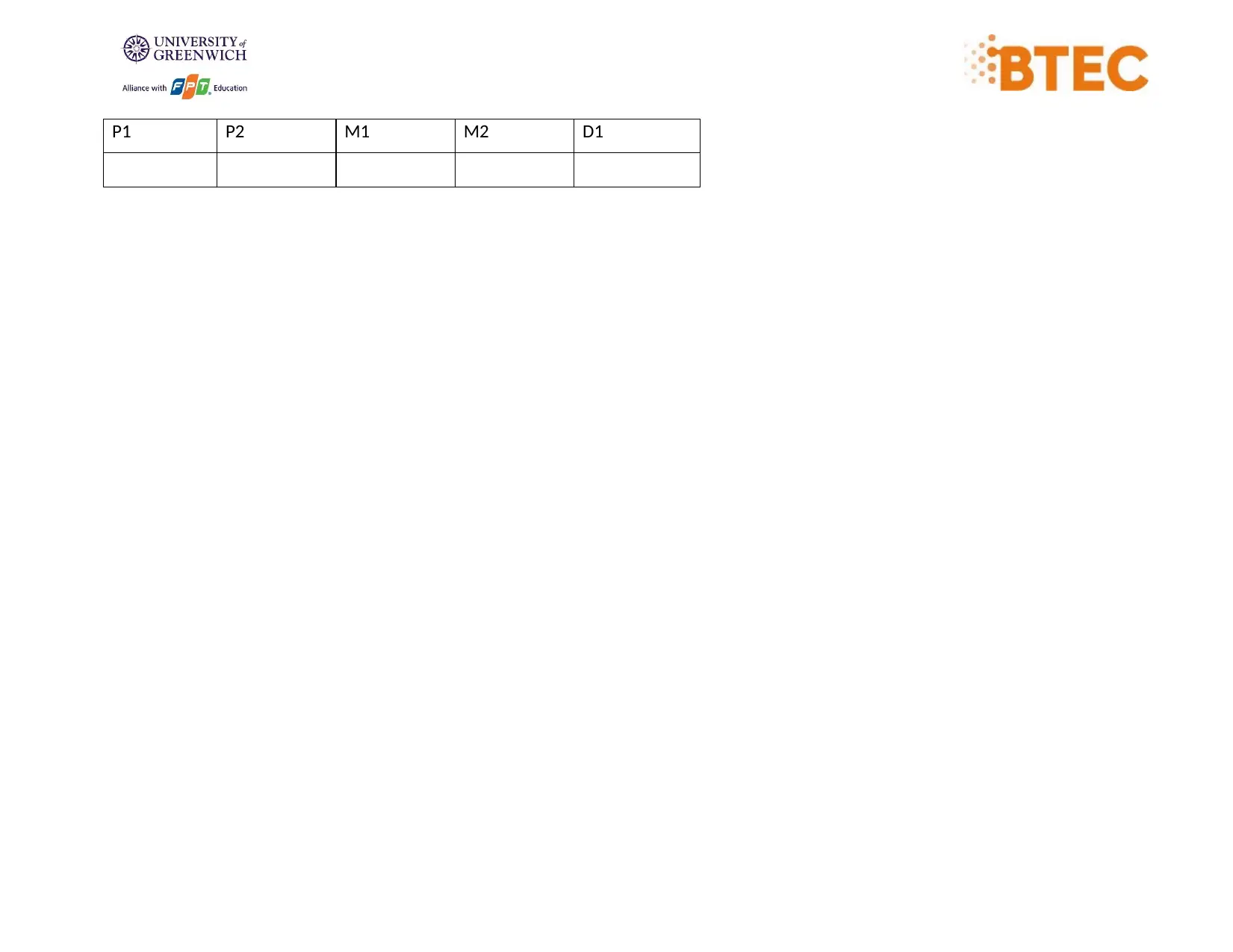
P1 P2 M1 M2 D1
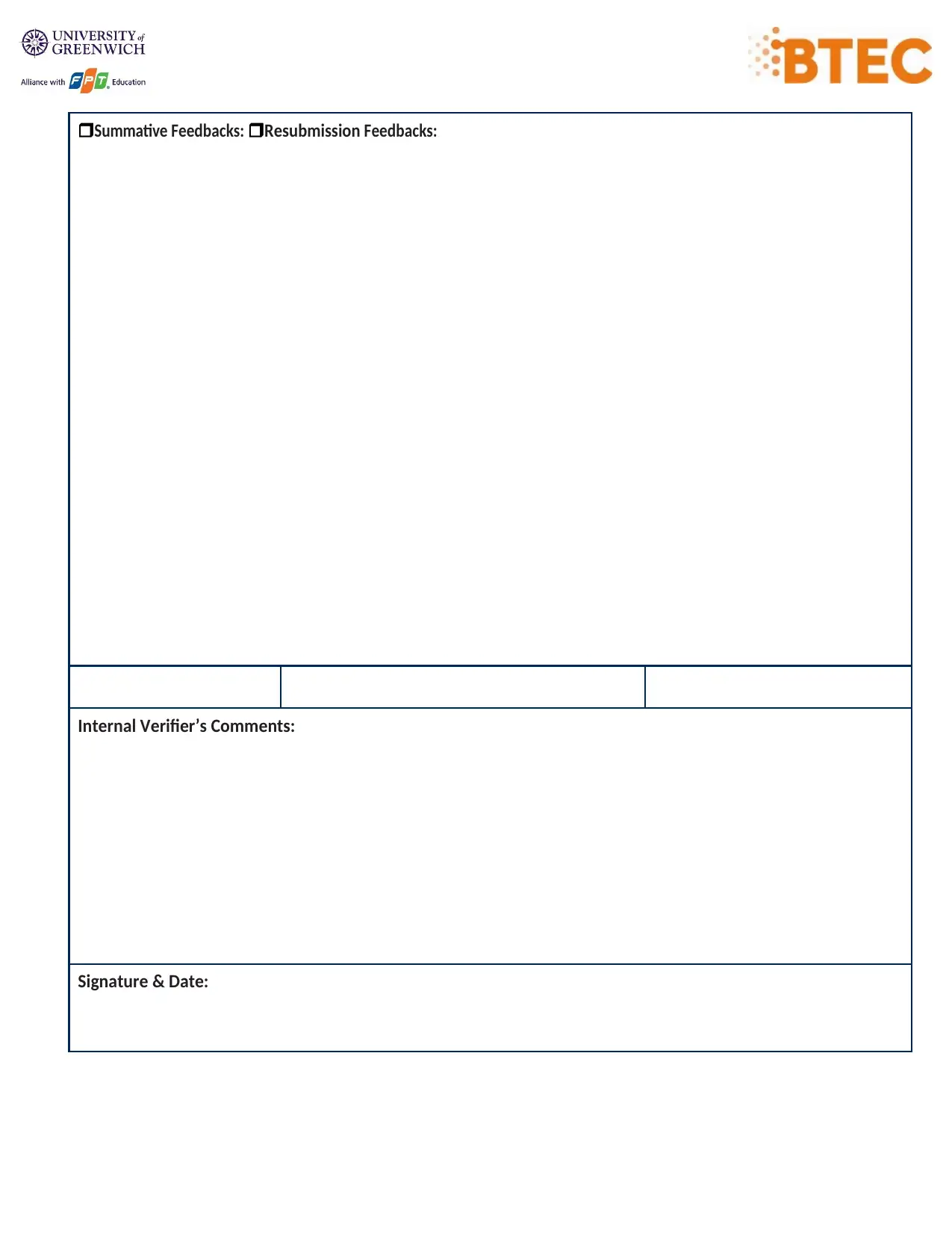
Summative Feedbacks: Resubmission Feedbacks:
Internal Verifier’s Comments:
Signature & Date:
Internal Verifier’s Comments:
Signature & Date:
⊘ This is a preview!⊘
Do you want full access?
Subscribe today to unlock all pages.

Trusted by 1+ million students worldwide
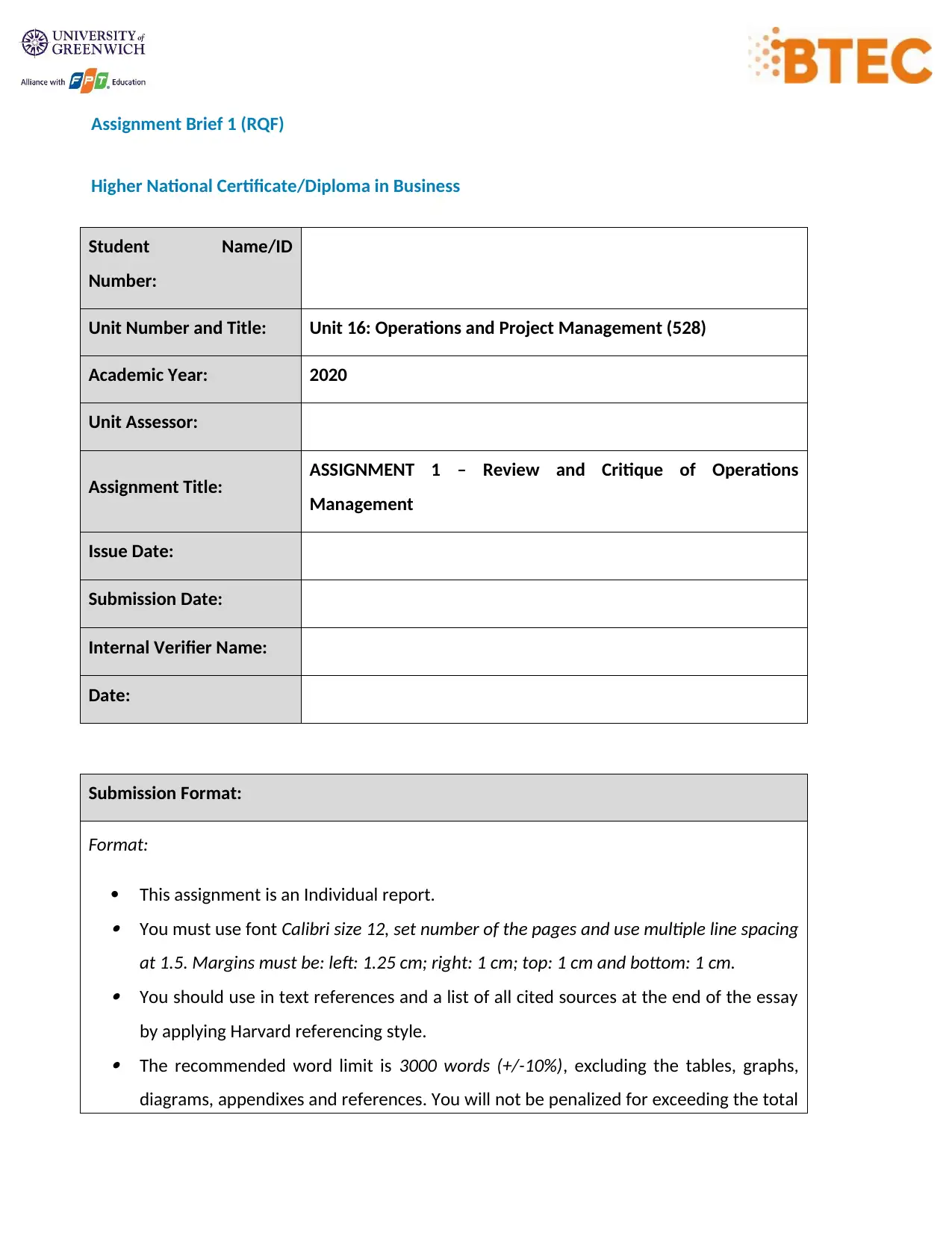
Assignment Brief 1 (RQF)
Higher National Certificate/Diploma in Business
Student Name/ID
Number:
Unit Number and Title: Unit 16: Operations and Project Management (528)
Academic Year: 2020
Unit Assessor:
Assignment Title: ASSIGNMENT 1 – Review and Critique of Operations
Management
Issue Date:
Submission Date:
Internal Verifier Name:
Date:
Submission Format:
Format:
This assignment is an Individual report. You must use font Calibri size 12, set number of the pages and use multiple line spacing
at 1.5. Margins must be: left: 1.25 cm; right: 1 cm; top: 1 cm and bottom: 1 cm. You should use in text references and a list of all cited sources at the end of the essay
by applying Harvard referencing style. The recommended word limit is 3000 words (+/-10%), excluding the tables, graphs,
diagrams, appendixes and references. You will not be penalized for exceeding the total
Higher National Certificate/Diploma in Business
Student Name/ID
Number:
Unit Number and Title: Unit 16: Operations and Project Management (528)
Academic Year: 2020
Unit Assessor:
Assignment Title: ASSIGNMENT 1 – Review and Critique of Operations
Management
Issue Date:
Submission Date:
Internal Verifier Name:
Date:
Submission Format:
Format:
This assignment is an Individual report. You must use font Calibri size 12, set number of the pages and use multiple line spacing
at 1.5. Margins must be: left: 1.25 cm; right: 1 cm; top: 1 cm and bottom: 1 cm. You should use in text references and a list of all cited sources at the end of the essay
by applying Harvard referencing style. The recommended word limit is 3000 words (+/-10%), excluding the tables, graphs,
diagrams, appendixes and references. You will not be penalized for exceeding the total
Paraphrase This Document
Need a fresh take? Get an instant paraphrase of this document with our AI Paraphraser
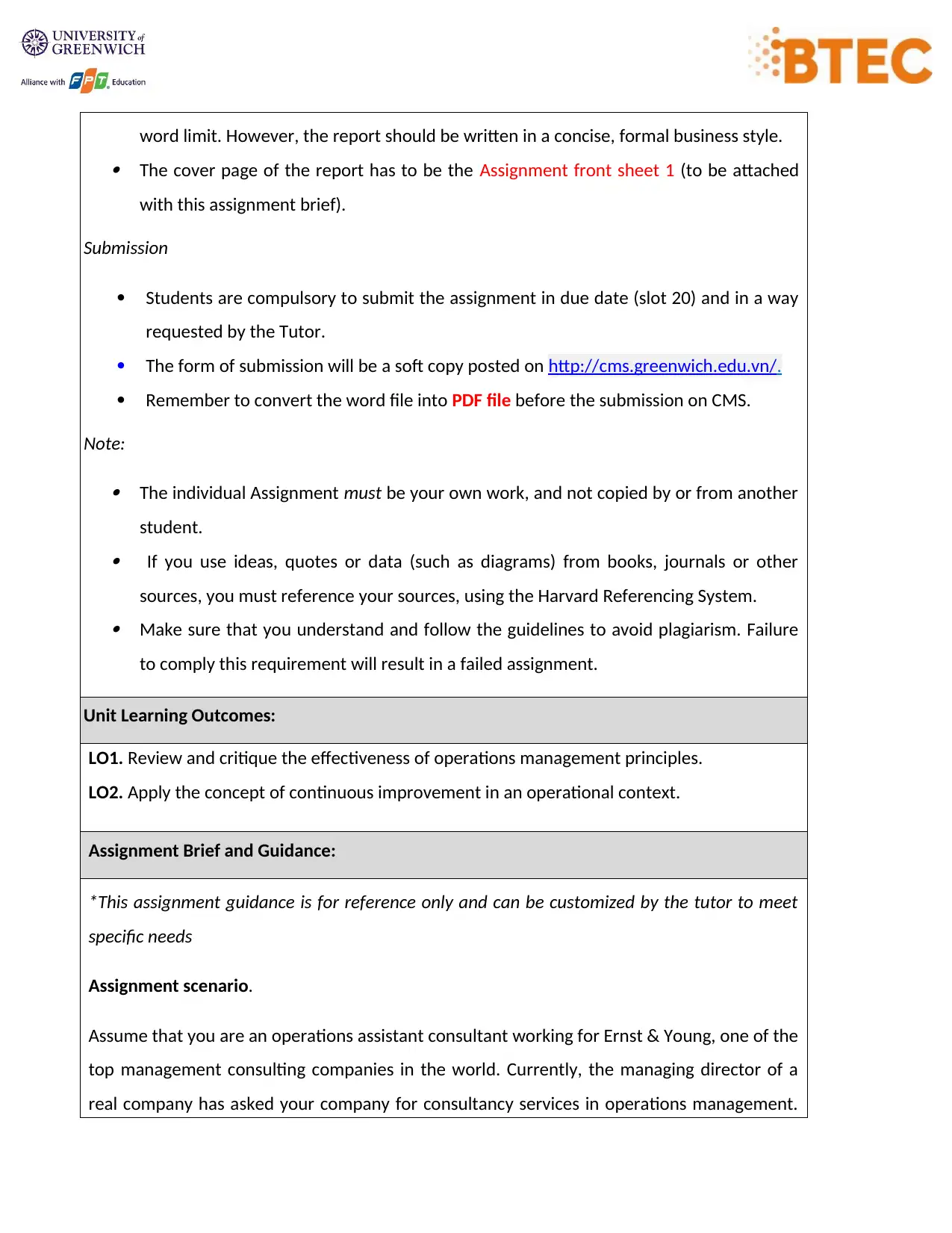
word limit. However, the report should be written in a concise, formal business style. The cover page of the report has to be the Assignment front sheet 1 (to be attached
with this assignment brief).
Submission
Students are compulsory to submit the assignment in due date (slot 20) and in a way
requested by the Tutor.
The form of submission will be a soft copy posted on http://cms.greenwich.edu.vn/.
Remember to convert the word file into PDF file before the submission on CMS.
Note:
The individual Assignment must be your own work, and not copied by or from another
student. If you use ideas, quotes or data (such as diagrams) from books, journals or other
sources, you must reference your sources, using the Harvard Referencing System. Make sure that you understand and follow the guidelines to avoid plagiarism. Failure
to comply this requirement will result in a failed assignment.
Unit Learning Outcomes:
LO1. Review and critique the effectiveness of operations management principles.
LO2. Apply the concept of continuous improvement in an operational context.
Assignment Brief and Guidance:
*This assignment guidance is for reference only and can be customized by the tutor to meet
specific needs
Assignment scenario.
Assume that you are an operations assistant consultant working for Ernst & Young, one of the
top management consulting companies in the world. Currently, the managing director of a
real company has asked your company for consultancy services in operations management.
with this assignment brief).
Submission
Students are compulsory to submit the assignment in due date (slot 20) and in a way
requested by the Tutor.
The form of submission will be a soft copy posted on http://cms.greenwich.edu.vn/.
Remember to convert the word file into PDF file before the submission on CMS.
Note:
The individual Assignment must be your own work, and not copied by or from another
student. If you use ideas, quotes or data (such as diagrams) from books, journals or other
sources, you must reference your sources, using the Harvard Referencing System. Make sure that you understand and follow the guidelines to avoid plagiarism. Failure
to comply this requirement will result in a failed assignment.
Unit Learning Outcomes:
LO1. Review and critique the effectiveness of operations management principles.
LO2. Apply the concept of continuous improvement in an operational context.
Assignment Brief and Guidance:
*This assignment guidance is for reference only and can be customized by the tutor to meet
specific needs
Assignment scenario.
Assume that you are an operations assistant consultant working for Ernst & Young, one of the
top management consulting companies in the world. Currently, the managing director of a
real company has asked your company for consultancy services in operations management.
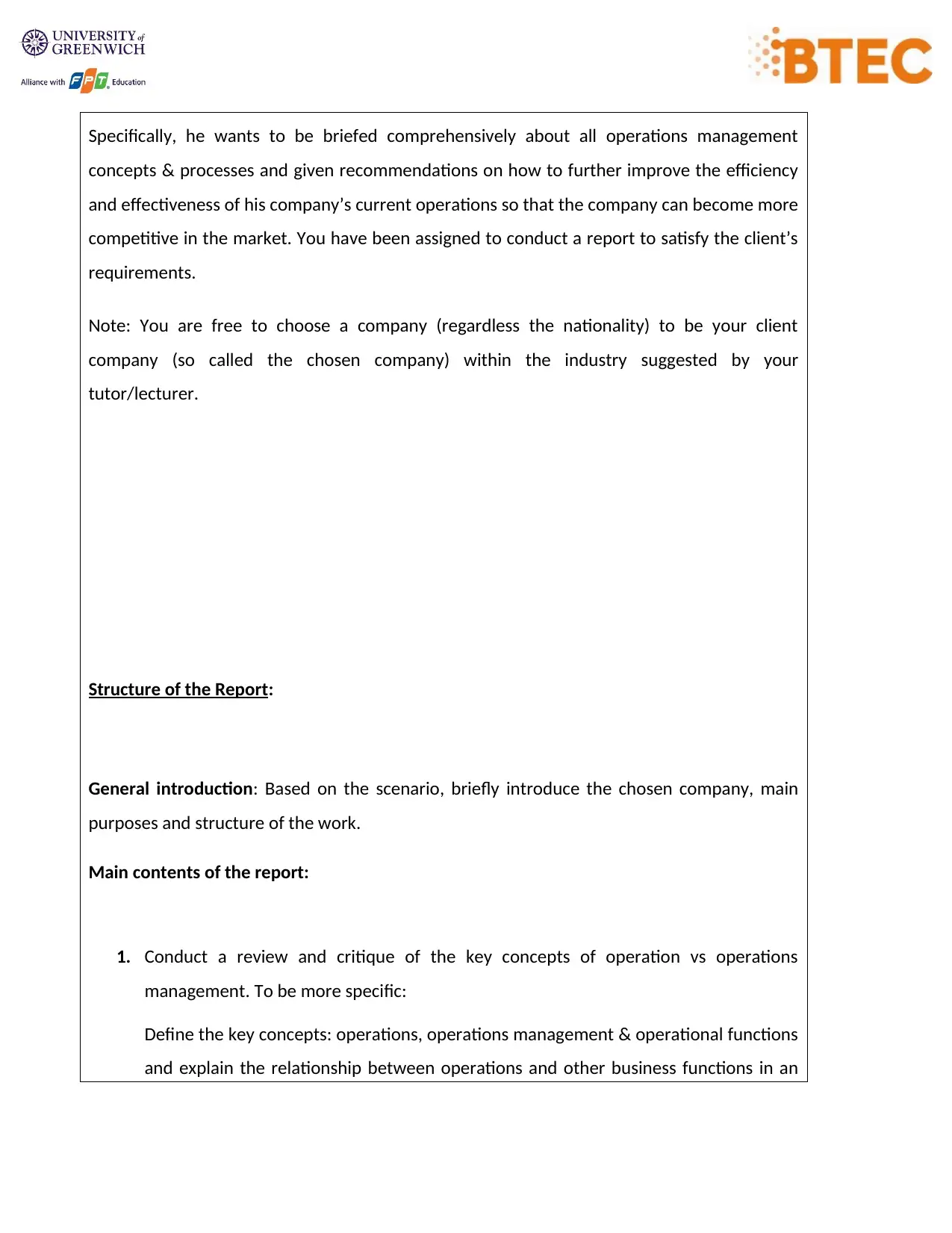
Specifically, he wants to be briefed comprehensively about all operations management
concepts & processes and given recommendations on how to further improve the efficiency
and effectiveness of his company’s current operations so that the company can become more
competitive in the market. You have been assigned to conduct a report to satisfy the client’s
requirements.
Note: You are free to choose a company (regardless the nationality) to be your client
company (so called the chosen company) within the industry suggested by your
tutor/lecturer.
Structure of the Report:
General introduction: Based on the scenario, briefly introduce the chosen company, main
purposes and structure of the work.
Main contents of the report:
1. Conduct a review and critique of the key concepts of operation vs operations
management. To be more specific:
Define the key concepts: operations, operations management & operational functions
and explain the relationship between operations and other business functions in an
concepts & processes and given recommendations on how to further improve the efficiency
and effectiveness of his company’s current operations so that the company can become more
competitive in the market. You have been assigned to conduct a report to satisfy the client’s
requirements.
Note: You are free to choose a company (regardless the nationality) to be your client
company (so called the chosen company) within the industry suggested by your
tutor/lecturer.
Structure of the Report:
General introduction: Based on the scenario, briefly introduce the chosen company, main
purposes and structure of the work.
Main contents of the report:
1. Conduct a review and critique of the key concepts of operation vs operations
management. To be more specific:
Define the key concepts: operations, operations management & operational functions
and explain the relationship between operations and other business functions in an
⊘ This is a preview!⊘
Do you want full access?
Subscribe today to unlock all pages.

Trusted by 1+ million students worldwide
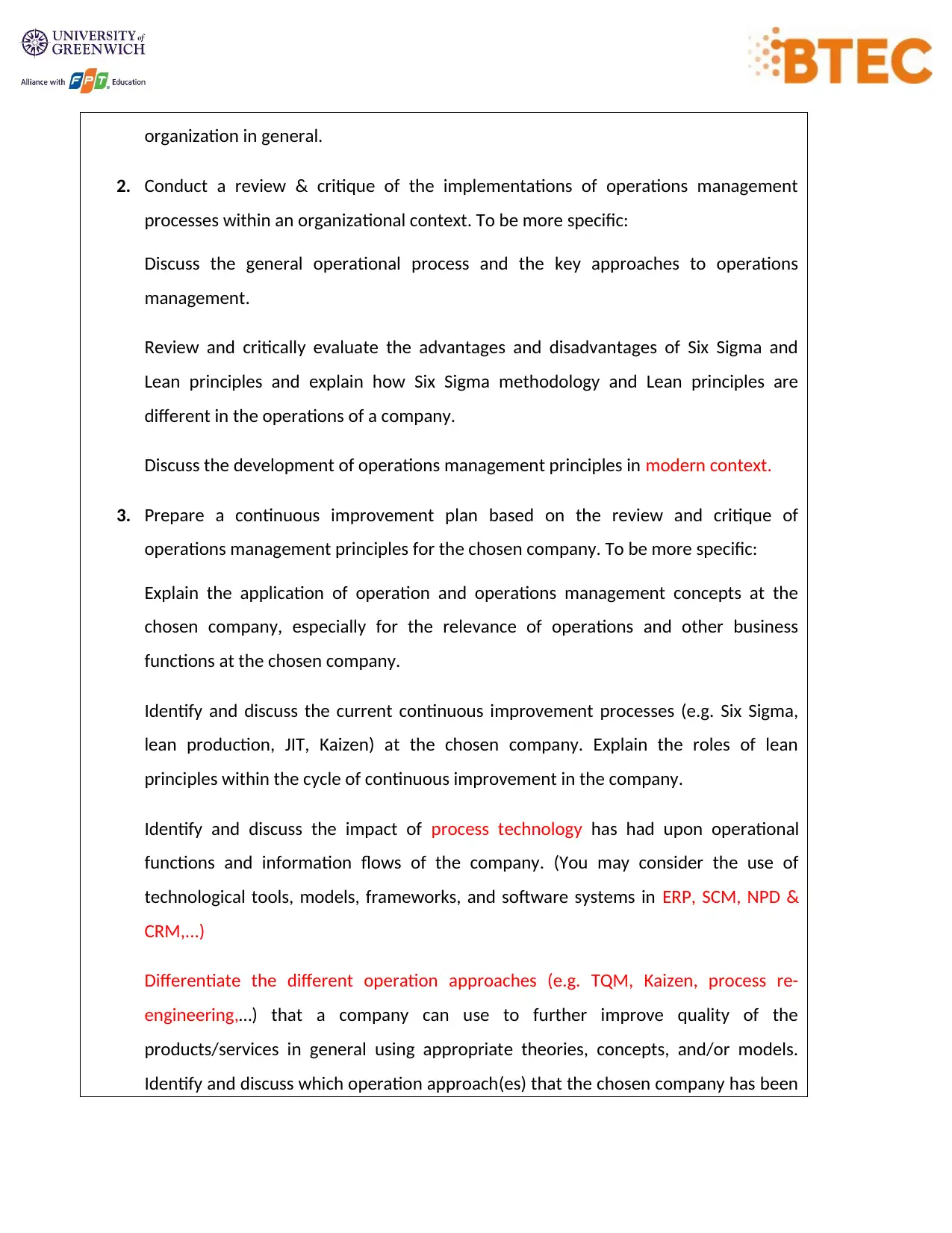
organization in general.
2. Conduct a review & critique of the implementations of operations management
processes within an organizational context. To be more specific:
Discuss the general operational process and the key approaches to operations
management.
Review and critically evaluate the advantages and disadvantages of Six Sigma and
Lean principles and explain how Six Sigma methodology and Lean principles are
different in the operations of a company.
Discuss the development of operations management principles in modern context.
3. Prepare a continuous improvement plan based on the review and critique of
operations management principles for the chosen company. To be more specific:
Explain the application of operation and operations management concepts at the
chosen company, especially for the relevance of operations and other business
functions at the chosen company.
Identify and discuss the current continuous improvement processes (e.g. Six Sigma,
lean production, JIT, Kaizen) at the chosen company. Explain the roles of lean
principles within the cycle of continuous improvement in the company.
Identify and discuss the impact of process technology has had upon operational
functions and information flows of the company. (You may consider the use of
technological tools, models, frameworks, and software systems in ERP, SCM, NPD &
CRM,...)
Differentiate the different operation approaches (e.g. TQM, Kaizen, process re-
engineering,…) that a company can use to further improve quality of the
products/services in general using appropriate theories, concepts, and/or models.
Identify and discuss which operation approach(es) that the chosen company has been
2. Conduct a review & critique of the implementations of operations management
processes within an organizational context. To be more specific:
Discuss the general operational process and the key approaches to operations
management.
Review and critically evaluate the advantages and disadvantages of Six Sigma and
Lean principles and explain how Six Sigma methodology and Lean principles are
different in the operations of a company.
Discuss the development of operations management principles in modern context.
3. Prepare a continuous improvement plan based on the review and critique of
operations management principles for the chosen company. To be more specific:
Explain the application of operation and operations management concepts at the
chosen company, especially for the relevance of operations and other business
functions at the chosen company.
Identify and discuss the current continuous improvement processes (e.g. Six Sigma,
lean production, JIT, Kaizen) at the chosen company. Explain the roles of lean
principles within the cycle of continuous improvement in the company.
Identify and discuss the impact of process technology has had upon operational
functions and information flows of the company. (You may consider the use of
technological tools, models, frameworks, and software systems in ERP, SCM, NPD &
CRM,...)
Differentiate the different operation approaches (e.g. TQM, Kaizen, process re-
engineering,…) that a company can use to further improve quality of the
products/services in general using appropriate theories, concepts, and/or models.
Identify and discuss which operation approach(es) that the chosen company has been
Paraphrase This Document
Need a fresh take? Get an instant paraphrase of this document with our AI Paraphraser
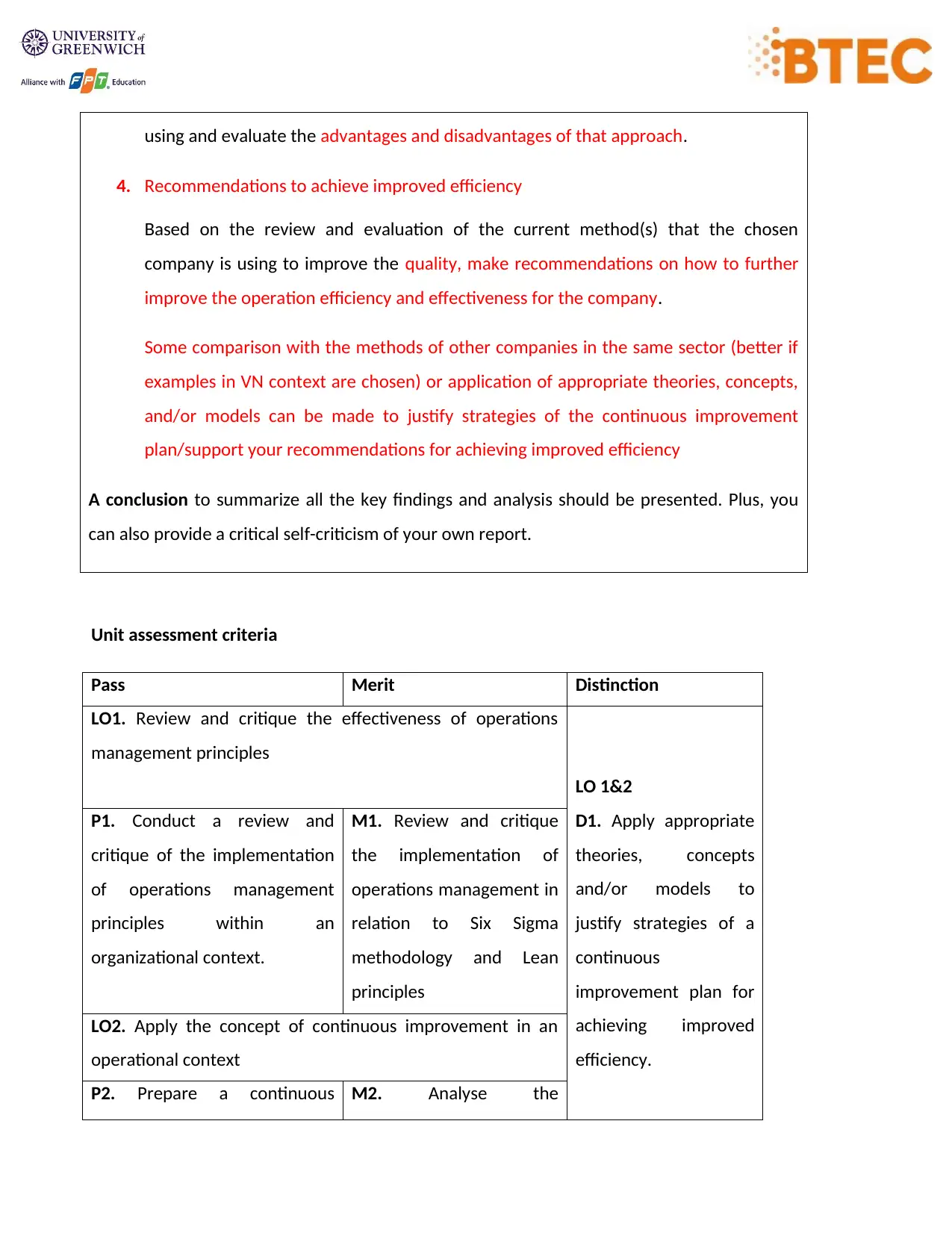
using and evaluate the advantages and disadvantages of that approach.
4. Recommendations to achieve improved efficiency
Based on the review and evaluation of the current method(s) that the chosen
company is using to improve the quality, make recommendations on how to further
improve the operation efficiency and effectiveness for the company.
Some comparison with the methods of other companies in the same sector (better if
examples in VN context are chosen) or application of appropriate theories, concepts,
and/or models can be made to justify strategies of the continuous improvement
plan/support your recommendations for achieving improved efficiency
A conclusion to summarize all the key findings and analysis should be presented. Plus, you
can also provide a critical self-criticism of your own report.
Unit assessment criteria
Pass Merit Distinction
LO1. Review and critique the effectiveness of operations
management principles
LO 1&2
D1. Apply appropriate
theories, concepts
and/or models to
justify strategies of a
continuous
improvement plan for
achieving improved
efficiency.
P1. Conduct a review and
critique of the implementation
of operations management
principles within an
organizational context.
M1. Review and critique
the implementation of
operations management in
relation to Six Sigma
methodology and Lean
principles
LO2. Apply the concept of continuous improvement in an
operational context
P2. Prepare a continuous M2. Analyse the
4. Recommendations to achieve improved efficiency
Based on the review and evaluation of the current method(s) that the chosen
company is using to improve the quality, make recommendations on how to further
improve the operation efficiency and effectiveness for the company.
Some comparison with the methods of other companies in the same sector (better if
examples in VN context are chosen) or application of appropriate theories, concepts,
and/or models can be made to justify strategies of the continuous improvement
plan/support your recommendations for achieving improved efficiency
A conclusion to summarize all the key findings and analysis should be presented. Plus, you
can also provide a critical self-criticism of your own report.
Unit assessment criteria
Pass Merit Distinction
LO1. Review and critique the effectiveness of operations
management principles
LO 1&2
D1. Apply appropriate
theories, concepts
and/or models to
justify strategies of a
continuous
improvement plan for
achieving improved
efficiency.
P1. Conduct a review and
critique of the implementation
of operations management
principles within an
organizational context.
M1. Review and critique
the implementation of
operations management in
relation to Six Sigma
methodology and Lean
principles
LO2. Apply the concept of continuous improvement in an
operational context
P2. Prepare a continuous M2. Analyse the
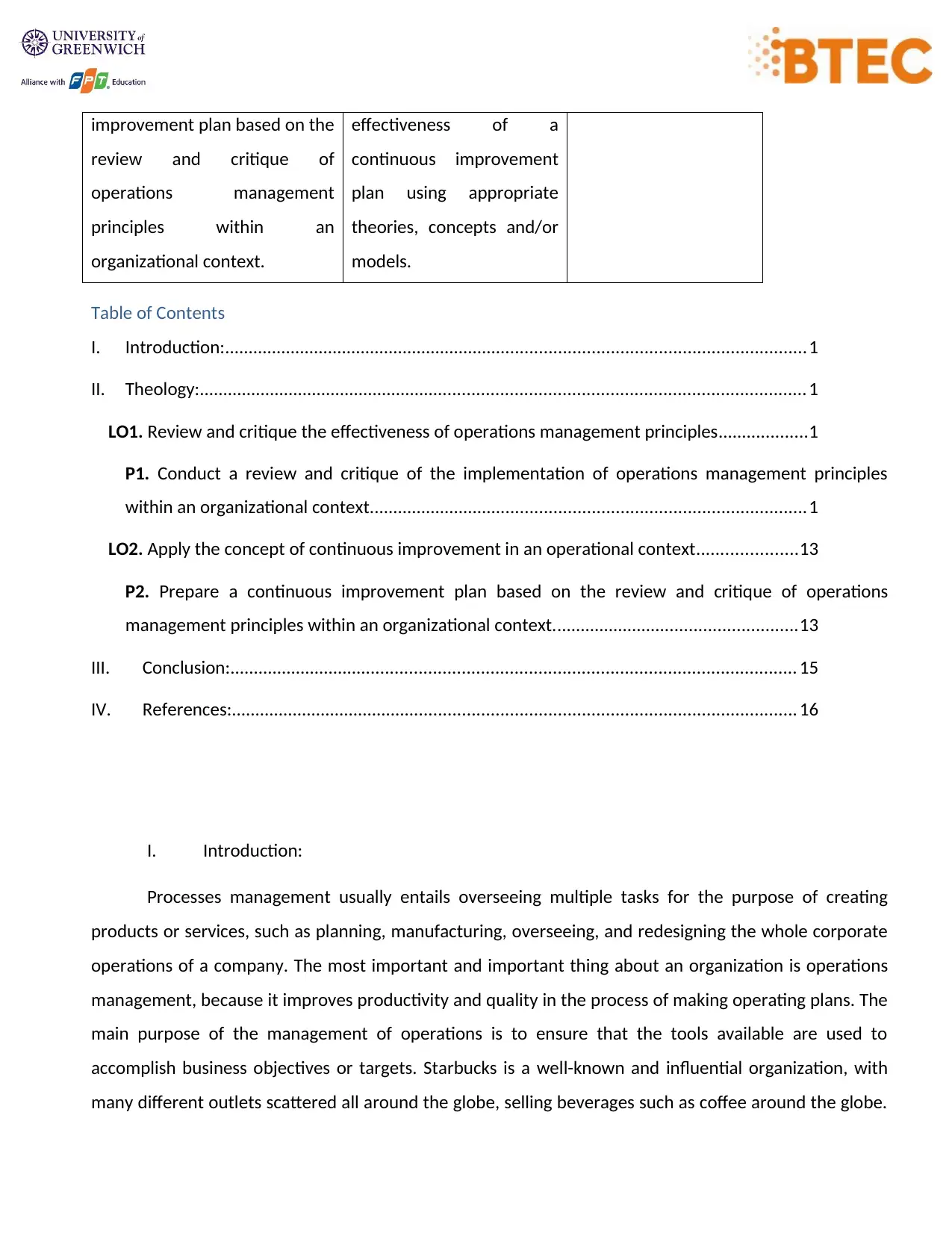
improvement plan based on the
review and critique of
operations management
principles within an
organizational context.
effectiveness of a
continuous improvement
plan using appropriate
theories, concepts and/or
models.
Table of Contents
I. Introduction:...........................................................................................................................1
II. Theology:................................................................................................................................ 1
LO1. Review and critique the effectiveness of operations management principles...................1
P1. Conduct a review and critique of the implementation of operations management principles
within an organizational context............................................................................................1
LO2. Apply the concept of continuous improvement in an operational context.....................13
P2. Prepare a continuous improvement plan based on the review and critique of operations
management principles within an organizational context....................................................13
III. Conclusion:....................................................................................................................... 15
IV. References:....................................................................................................................... 16
I. Introduction:
Processes management usually entails overseeing multiple tasks for the purpose of creating
products or services, such as planning, manufacturing, overseeing, and redesigning the whole corporate
operations of a company. The most important and important thing about an organization is operations
management, because it improves productivity and quality in the process of making operating plans. The
main purpose of the management of operations is to ensure that the tools available are used to
accomplish business objectives or targets. Starbucks is a well-known and influential organization, with
many different outlets scattered all around the globe, selling beverages such as coffee around the globe.
review and critique of
operations management
principles within an
organizational context.
effectiveness of a
continuous improvement
plan using appropriate
theories, concepts and/or
models.
Table of Contents
I. Introduction:...........................................................................................................................1
II. Theology:................................................................................................................................ 1
LO1. Review and critique the effectiveness of operations management principles...................1
P1. Conduct a review and critique of the implementation of operations management principles
within an organizational context............................................................................................1
LO2. Apply the concept of continuous improvement in an operational context.....................13
P2. Prepare a continuous improvement plan based on the review and critique of operations
management principles within an organizational context....................................................13
III. Conclusion:....................................................................................................................... 15
IV. References:....................................................................................................................... 16
I. Introduction:
Processes management usually entails overseeing multiple tasks for the purpose of creating
products or services, such as planning, manufacturing, overseeing, and redesigning the whole corporate
operations of a company. The most important and important thing about an organization is operations
management, because it improves productivity and quality in the process of making operating plans. The
main purpose of the management of operations is to ensure that the tools available are used to
accomplish business objectives or targets. Starbucks is a well-known and influential organization, with
many different outlets scattered all around the globe, selling beverages such as coffee around the globe.
⊘ This is a preview!⊘
Do you want full access?
Subscribe today to unlock all pages.

Trusted by 1+ million students worldwide
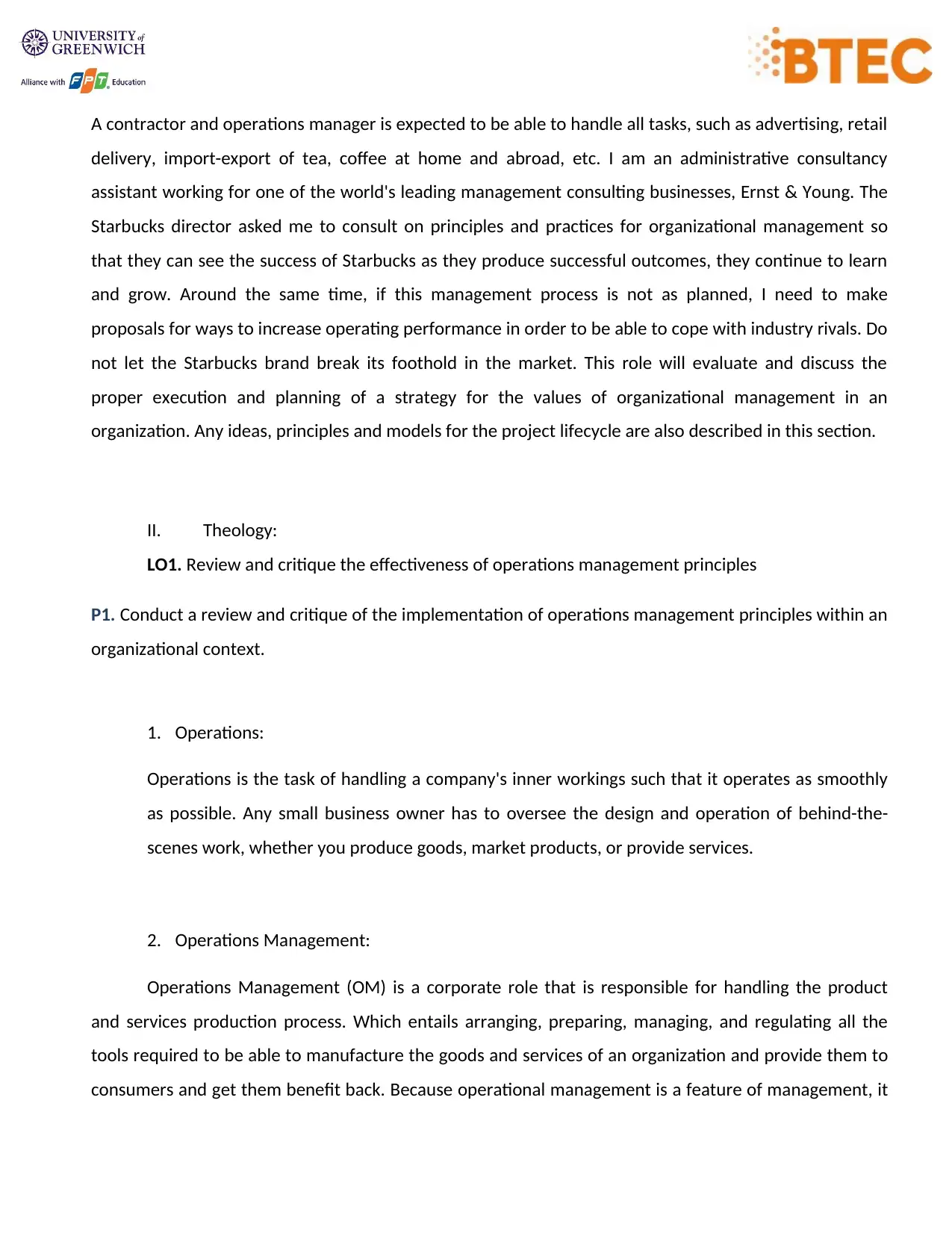
A contractor and operations manager is expected to be able to handle all tasks, such as advertising, retail
delivery, import-export of tea, coffee at home and abroad, etc. I am an administrative consultancy
assistant working for one of the world's leading management consulting businesses, Ernst & Young. The
Starbucks director asked me to consult on principles and practices for organizational management so
that they can see the success of Starbucks as they produce successful outcomes, they continue to learn
and grow. Around the same time, if this management process is not as planned, I need to make
proposals for ways to increase operating performance in order to be able to cope with industry rivals. Do
not let the Starbucks brand break its foothold in the market. This role will evaluate and discuss the
proper execution and planning of a strategy for the values of organizational management in an
organization. Any ideas, principles and models for the project lifecycle are also described in this section.
II. Theology:
LO1. Review and critique the effectiveness of operations management principles
P1. Conduct a review and critique of the implementation of operations management principles within an
organizational context.
1. Operations:
Operations is the task of handling a company's inner workings such that it operates as smoothly
as possible. Any small business owner has to oversee the design and operation of behind-the-
scenes work, whether you produce goods, market products, or provide services.
2. Operations Management:
Operations Management (OM) is a corporate role that is responsible for handling the product
and services production process. Which entails arranging, preparing, managing, and regulating all the
tools required to be able to manufacture the goods and services of an organization and provide them to
consumers and get them benefit back. Because operational management is a feature of management, it
delivery, import-export of tea, coffee at home and abroad, etc. I am an administrative consultancy
assistant working for one of the world's leading management consulting businesses, Ernst & Young. The
Starbucks director asked me to consult on principles and practices for organizational management so
that they can see the success of Starbucks as they produce successful outcomes, they continue to learn
and grow. Around the same time, if this management process is not as planned, I need to make
proposals for ways to increase operating performance in order to be able to cope with industry rivals. Do
not let the Starbucks brand break its foothold in the market. This role will evaluate and discuss the
proper execution and planning of a strategy for the values of organizational management in an
organization. Any ideas, principles and models for the project lifecycle are also described in this section.
II. Theology:
LO1. Review and critique the effectiveness of operations management principles
P1. Conduct a review and critique of the implementation of operations management principles within an
organizational context.
1. Operations:
Operations is the task of handling a company's inner workings such that it operates as smoothly
as possible. Any small business owner has to oversee the design and operation of behind-the-
scenes work, whether you produce goods, market products, or provide services.
2. Operations Management:
Operations Management (OM) is a corporate role that is responsible for handling the product
and services production process. Which entails arranging, preparing, managing, and regulating all the
tools required to be able to manufacture the goods and services of an organization and provide them to
consumers and get them benefit back. Because operational management is a feature of management, it
Paraphrase This Document
Need a fresh take? Get an instant paraphrase of this document with our AI Paraphraser
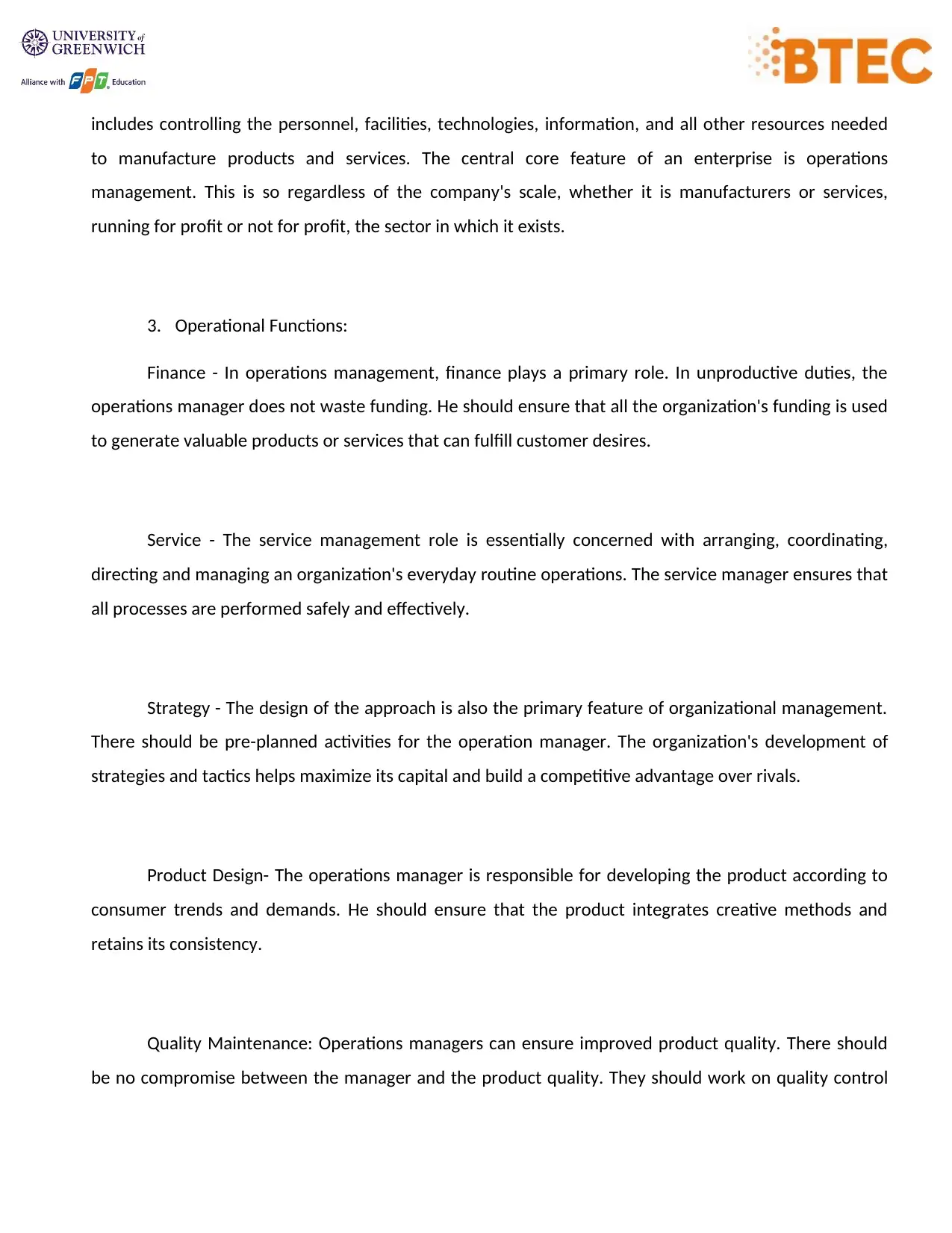
includes controlling the personnel, facilities, technologies, information, and all other resources needed
to manufacture products and services. The central core feature of an enterprise is operations
management. This is so regardless of the company's scale, whether it is manufacturers or services,
running for profit or not for profit, the sector in which it exists.
3. Operational Functions:
Finance - In operations management, finance plays a primary role. In unproductive duties, the
operations manager does not waste funding. He should ensure that all the organization's funding is used
to generate valuable products or services that can fulfill customer desires.
Service - The service management role is essentially concerned with arranging, coordinating,
directing and managing an organization's everyday routine operations. The service manager ensures that
all processes are performed safely and effectively.
Strategy - The design of the approach is also the primary feature of organizational management.
There should be pre-planned activities for the operation manager. The organization's development of
strategies and tactics helps maximize its capital and build a competitive advantage over rivals.
Product Design- The operations manager is responsible for developing the product according to
consumer trends and demands. He should ensure that the product integrates creative methods and
retains its consistency.
Quality Maintenance: Operations managers can ensure improved product quality. There should
be no compromise between the manager and the product quality. They should work on quality control
to manufacture products and services. The central core feature of an enterprise is operations
management. This is so regardless of the company's scale, whether it is manufacturers or services,
running for profit or not for profit, the sector in which it exists.
3. Operational Functions:
Finance - In operations management, finance plays a primary role. In unproductive duties, the
operations manager does not waste funding. He should ensure that all the organization's funding is used
to generate valuable products or services that can fulfill customer desires.
Service - The service management role is essentially concerned with arranging, coordinating,
directing and managing an organization's everyday routine operations. The service manager ensures that
all processes are performed safely and effectively.
Strategy - The design of the approach is also the primary feature of organizational management.
There should be pre-planned activities for the operation manager. The organization's development of
strategies and tactics helps maximize its capital and build a competitive advantage over rivals.
Product Design- The operations manager is responsible for developing the product according to
consumer trends and demands. He should ensure that the product integrates creative methods and
retains its consistency.
Quality Maintenance: Operations managers can ensure improved product quality. There should
be no compromise between the manager and the product quality. They should work on quality control
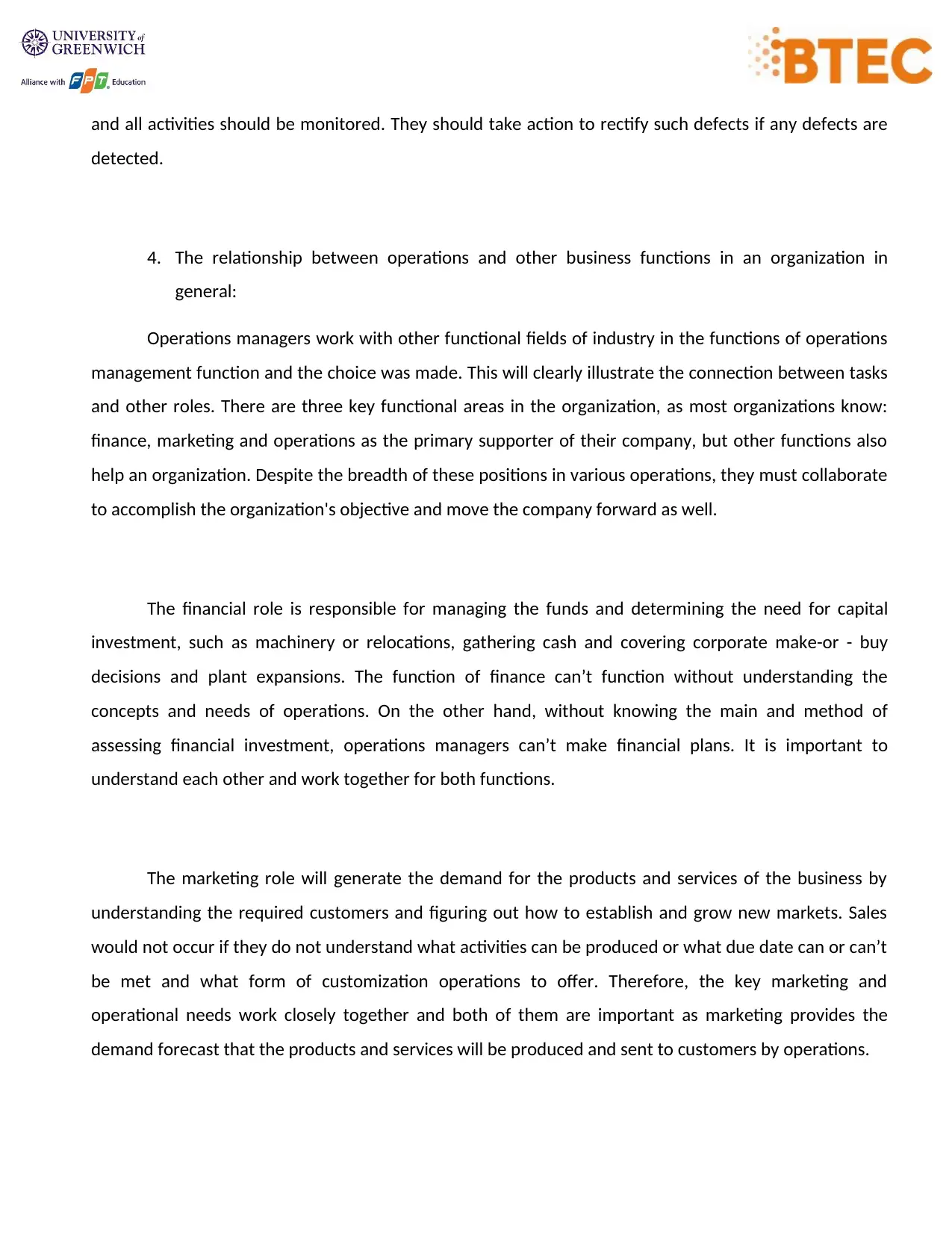
and all activities should be monitored. They should take action to rectify such defects if any defects are
detected.
4. The relationship between operations and other business functions in an organization in
general:
Operations managers work with other functional fields of industry in the functions of operations
management function and the choice was made. This will clearly illustrate the connection between tasks
and other roles. There are three key functional areas in the organization, as most organizations know:
finance, marketing and operations as the primary supporter of their company, but other functions also
help an organization. Despite the breadth of these positions in various operations, they must collaborate
to accomplish the organization's objective and move the company forward as well.
The financial role is responsible for managing the funds and determining the need for capital
investment, such as machinery or relocations, gathering cash and covering corporate make-or - buy
decisions and plant expansions. The function of finance can’t function without understanding the
concepts and needs of operations. On the other hand, without knowing the main and method of
assessing financial investment, operations managers can’t make financial plans. It is important to
understand each other and work together for both functions.
The marketing role will generate the demand for the products and services of the business by
understanding the required customers and figuring out how to establish and grow new markets. Sales
would not occur if they do not understand what activities can be produced or what due date can or can’t
be met and what form of customization operations to offer. Therefore, the key marketing and
operational needs work closely together and both of them are important as marketing provides the
demand forecast that the products and services will be produced and sent to customers by operations.
detected.
4. The relationship between operations and other business functions in an organization in
general:
Operations managers work with other functional fields of industry in the functions of operations
management function and the choice was made. This will clearly illustrate the connection between tasks
and other roles. There are three key functional areas in the organization, as most organizations know:
finance, marketing and operations as the primary supporter of their company, but other functions also
help an organization. Despite the breadth of these positions in various operations, they must collaborate
to accomplish the organization's objective and move the company forward as well.
The financial role is responsible for managing the funds and determining the need for capital
investment, such as machinery or relocations, gathering cash and covering corporate make-or - buy
decisions and plant expansions. The function of finance can’t function without understanding the
concepts and needs of operations. On the other hand, without knowing the main and method of
assessing financial investment, operations managers can’t make financial plans. It is important to
understand each other and work together for both functions.
The marketing role will generate the demand for the products and services of the business by
understanding the required customers and figuring out how to establish and grow new markets. Sales
would not occur if they do not understand what activities can be produced or what due date can or can’t
be met and what form of customization operations to offer. Therefore, the key marketing and
operational needs work closely together and both of them are important as marketing provides the
demand forecast that the products and services will be produced and sent to customers by operations.
⊘ This is a preview!⊘
Do you want full access?
Subscribe today to unlock all pages.

Trusted by 1+ million students worldwide
1 out of 36
Related Documents
Your All-in-One AI-Powered Toolkit for Academic Success.
+13062052269
info@desklib.com
Available 24*7 on WhatsApp / Email
![[object Object]](/_next/static/media/star-bottom.7253800d.svg)
Unlock your academic potential
Copyright © 2020–2026 A2Z Services. All Rights Reserved. Developed and managed by ZUCOL.





